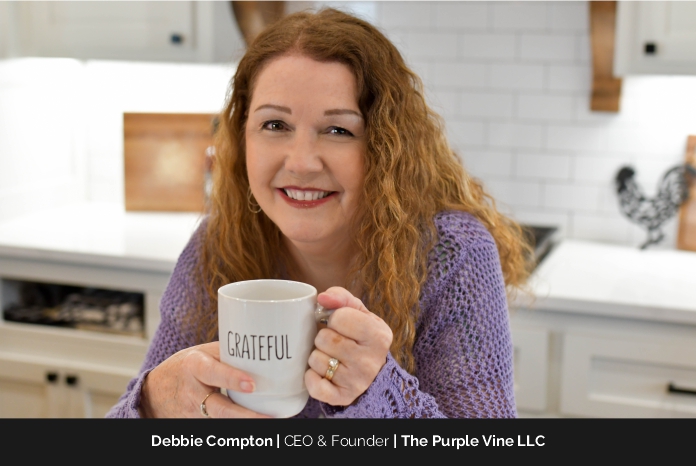Caregiving often arrives without warning. One moment you’re managing a busy career or family life, and the next, you’re coordinating medications, hospital visits, and daily routines for a loved one who can no longer manage on their own.
For Debbie Compton, this shift came abruptly. A seasoned corporate leader with 15 years of experience managing teams across the country, Debbie’s professional life was thriving. “I planned to retire there,” she said, recalling her role at a large corporation. But life at home told a different story.
Her father was diagnosed with Parkinson’s, her mother was already living with vascular dementia, and her mother-in-law began showing signs of Alzheimer’s. It was a whirlwind of emergencies from different corners of the country. “I was on the East Coast when Dad accidentally took Mom’s pills. I was on the West Coast when mom passed out and had to be rushed to the hospital,” she shared. Her family lived in Oklahoma, far from either coast. The long-distance caregiving wasn’t sustainable.
Debbie made the tough call to step away from her corporate career and become a full-time caregiver. But nothing had prepared her for what was ahead.
Learning on the Go
“I felt completely unprepared,” she said. Though she immersed herself in medical research, spoke with professionals, and scoured the internet, most of what she found was clinical, not helpful in everyday life.
“When dad began hallucinating, I found explanations of brain changes, but not how to respond,” she explained. “I wanted to know what to do in that moment, how to calm him, how to help.”
That frustration only deepened as her mother’s symptoms worsened. When her mother-in-law moved in, the household became a full-time caregiving center. But still, the support they needed wasn’t out there. So, Debbie and her husband began developing their own tools, practical solutions to daily caregiving challenges. These experiences planted the seeds for what would become her mission and business.
The Birth of The Purple Vine
After two of her loved ones passed away, Debbie earned certifications in caregiving and advocacy. She founded The Purple Vine LLC, a company aimed at helping caregivers feel less overwhelmed and more equipped.
Her first book, Caregiving: How to Hold On While Letting Go, offers real-world tips she wished she had known earlier. “My goal is to reduce stress, prevent burnout, and shorten the learning curve for other caregivers,” she said.
Debbie’s approach is built on understanding and customization. “Caregiving is different for everyone,” she said. “Different cultures, family dynamics, and personal beliefs shape what works.” She doesn’t offer one-size-fits-all answers. Instead, she asks thoughtful questions and builds strategies tailored to each caregiver’s needs.
A Moment That Changed Everything
One story stays close to her heart. Susan, a caregiver for her mother with Alzheimer’s, broke down during a consultation. “She was exhausted and alone in her struggle,” Debbie recalled. Her siblings didn’t understand the disease and weren’t offering support.
Debbie invited the family to a group Zoom session. “I explained the disease and what Susan was going through,” she said. “They cried. They apologized. They didn’t realize how much she was carrying.” The family left with an action plan and a better understanding of what caregiving requires. “Seeing their change in perspective was incredibly rewarding,” she said.
Building a Community of Support
While The Purple Vine has grown steadily, it hasn’t been without challenges. One of the biggest hurdles, Debbie notes, is that many people don’t even realize they’re caregivers. “They think they’re just helping a parent or a spouse. They don’t identify with the term ‘caregiver,’” she explained. “This makes it harder to reach them with the support they desperately need.”
Debbie shares resources online, writes blog posts, conducts 1:1 Zoom consultations, and speaks publicly in hopes that people recognize their role and find help. “Sometimes it takes time, but when their need increases, I hope they remember I’m here,” she said.
Debbie not only teaches stress-reducing techniques, she uses them herself. Her “5 Minute Fixes” are quick practices backed by science that help lower stress and boost focus. She also finds peace in her garden. “It’s quiet, grounding. Watching God’s creation grow helps me reset,” she said. It’s a reminder that even in the middle of caregiving chaos, personal wellness matters.
Writing for Impact
Debbie’s work reached a broader audience through her collaborative book, The Caregiver’s Advocate. Featuring 21 authors from four countries, it became a number-one bestseller in all six categories in the U.S., Australia, and Canada. It also earned top 50 in the U.K. and #1 Amazon New Release.
Now, she’s preparing to launch Volume 2 in August 2025. “Each chapter is filled with things I wish I had known,” she said.
As the lead author, Debbie selects contributors, defines the vision, and ensures the book delivers practical, hopeful strategies. She works closely with Brave Healer Productions to bring the project to life and keeps all 21 authors on track like a “cat herder,” as she puts it with a smile. Her priority is to ensure that every chapter speaks with clarity, compassion, and purpose before it’s handed off to the editors.
Changing Systems One Step at a Time
As populations age, Debbie sees a growing need for caregiving education and support. “The demand for care is rising fast, but the training isn’t keeping pace,” she said. That’s where The Purple Vine steps in.
Her company offers training programs for individuals and groups, caregiver support calls, workshops, and customized plans for companies that want to support employee caregivers. “When companies support caregivers, they retain employees and reduce stress across the board,” she explained. Debbie also encourages others in healthcare to build connections, not just push products. “Offer value first. Get to know people. The caregiving community is built on trust,” she advised.
A Life Rewritten with Purpose
Debbie never planned this path. But the moment she chose to care for her loved ones, everything shifted. What began as a crisis turned into a calling.
“I live my purpose every day,” she said. Whether she’s educating others about dementia, writing books and blog posts, or holding workshops, every part of her work reflects that purpose. One of her favorite innovations is the integration of seniors and orphans in shared living spaces, where both groups benefit from mutual connection. Her work, grounded in experience and empathy, continues to support caregivers around the world.
For anyone silently struggling with caregiving today, Debbie Compton wants them to know: They’re not alone. Help is here, and hope is real.
Conclusion
Debbie Compton’s journey reflects the quiet courage found in so many caregivers, those who step up without recognition, without training, and often without rest. What sets her apart is her unwavering commitment to turn that personal struggle into practical change for others. Through her voice, resources, and relentless advocacy, she reminds us that caregiving isn’t just about responsibility. It’s about humanity, resilience, and the power of showing up for others and for yourself.





